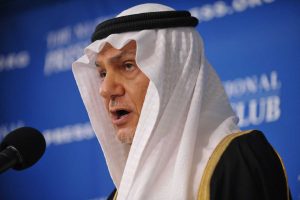Saudi Arabia's former intel chief calls weapons proliferation risk in Afghanistan very worrying as terror threat grows

- Taliban forces have been pictured with a range of U.S.-made weaponry and vehicles seized from the Afghan military, sparking fear in Saudi Arabia about the enduring threat of ISIS and Al Qaeda and where and with whom the equipment might end up.
DUBAI, United Arab Emirates — Saudi Arabia's former intelligence chief says he is very worried that American weapons could fall into the hands of militant groups such as Al Qaeda, bolstering a sworn enemy of the United States in the wake of an exit from Afghanistan that he says was mismanaged.
"I don't know which word to use, whether incompetence, carelessness, bad management — it was all a combination of those things," Prince Turki Al-Faisal told CNBC's Hadley Gamble in Paris on Saturday.
Prince Turki Al-Faisal served as head of the Saudi intelligence services between 1979 and 2001, helping to coordinate anti-Communist activity in Afghanistan during the Soviet invasion. He later tried — and failed — to negotiate the return of Osama bin Laden to Saudi Arabia in the years before 9/11.
"You know Al Qaeda targeted the kingdom first before anyone else," Al-Faisal said, referring to Saudi Arabia. "It is very worrisome, that aspect of it, and now with this weaponry the ally of the Taliban, Al Qaeda, may get their hands on, it's going to be even more worrisome," he added.
Taliban forces have been pictured with a range of U.S.-made weaponry and vehicles seized from the Afghan military, sparking fear in Saudi Arabia about the enduring threat of ISIS and Al Qaeda and where and with whom the equipment might end up.
"When Mr. Trump made the deal with the Taliban before he left office, it was inevitable that the government would lose its legitimacy," Al-Faisal said. "It's difficult to know what led the United States to negotiate with them," he added.
The comments are the first openly critical response from America's Gulf Arab allies since the fall of Kabul on August 15.
They come as President Joe Biden warned on Saturday that another attack on Kabul airport was "highly likely." The President also vowed to issue another retaliatory strike against the terrorists responsible for Thursday's suicide bombing that killed 13 U.S. service members and more than 110 Afghans.
ISIS-K, known as Islamic State Khorasan, claimed responsibility for the attack. ISIS-K and the Islamic State were once allied with Al Qaeda, the terrorist organization formerly led by Osama bin Laden that orchestrated the September 11 attacks and other significant attacks in recent decades.
The increasingly complex threat from ISIS-K and others is a major challenge for the U.S. and western forces racing to evacuate the remaining military personnel and Afghan allies escaping Afghanistan before the August 31 withdrawal deadline.
NATO has been clear that it expected the Taliban to keep its "commitment" that it will not allow Afghanistan to become a haven for terrorists, Secretary General Jens Stoltenberg told CNBC in a recent interview, but it's still unclear if the Taliban is capable of managing the possible contagion, or if the most recent attack in Kabul could embolden individuals or terror groups around the wider region.
Regional actors
Prince Turki said it would be Saudi Arabia's regional rival Iran, Pakistan, and foreign powers in strategic competition with the U.S. like China and Russia that will wield significant influence in Afghanistan and among the terrorist groups that interconnect there after the American withdrawal.
"We've seen the Russian ambassador, Chinese ambassador, Iranian ambassador and Pakistani ambassador not only remaining in Kabul, but making statements about future relations with the Taliban," he said.
"There is something going on between the Taliban and these countries about where they're going to go in the future," he said.
China was among the first countries that expressed willingness to engage with the Taliban when it swept to power in Afghanistan, seeking to pick up where America left off.
Nevertheless, while global confidence in American leadership may have been shaken, Al-Faisal said the episode didn't necessarily mean the end of American supremacy globally: "I think it's still too early to judge whether America is in a watershed moment," he said.
Source: Read Full Article
